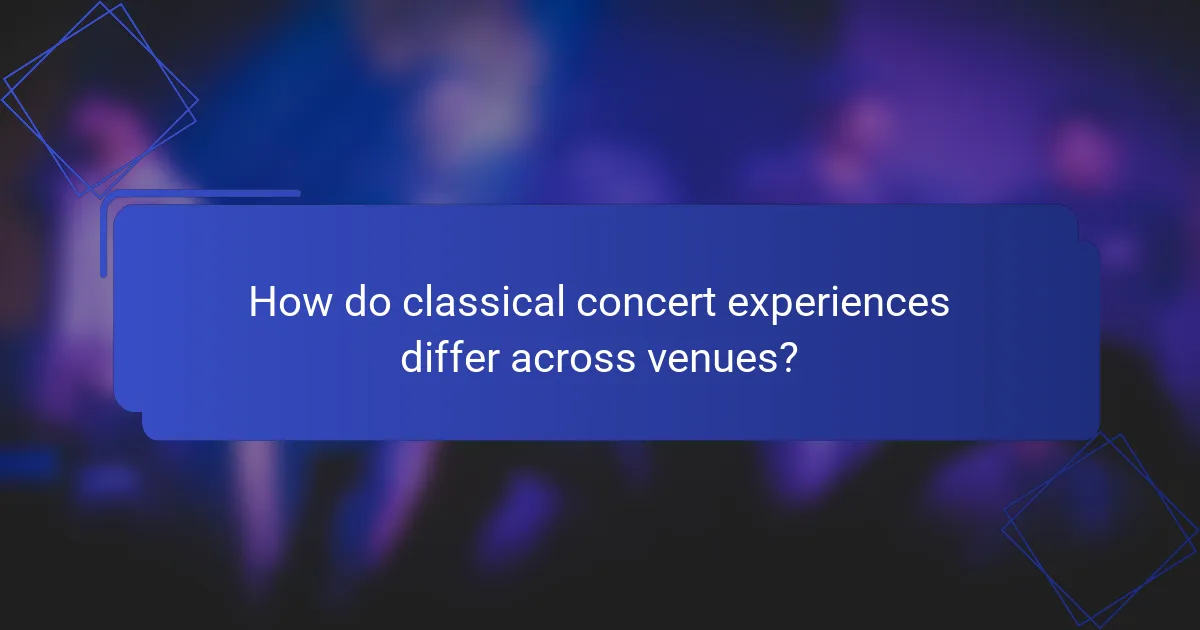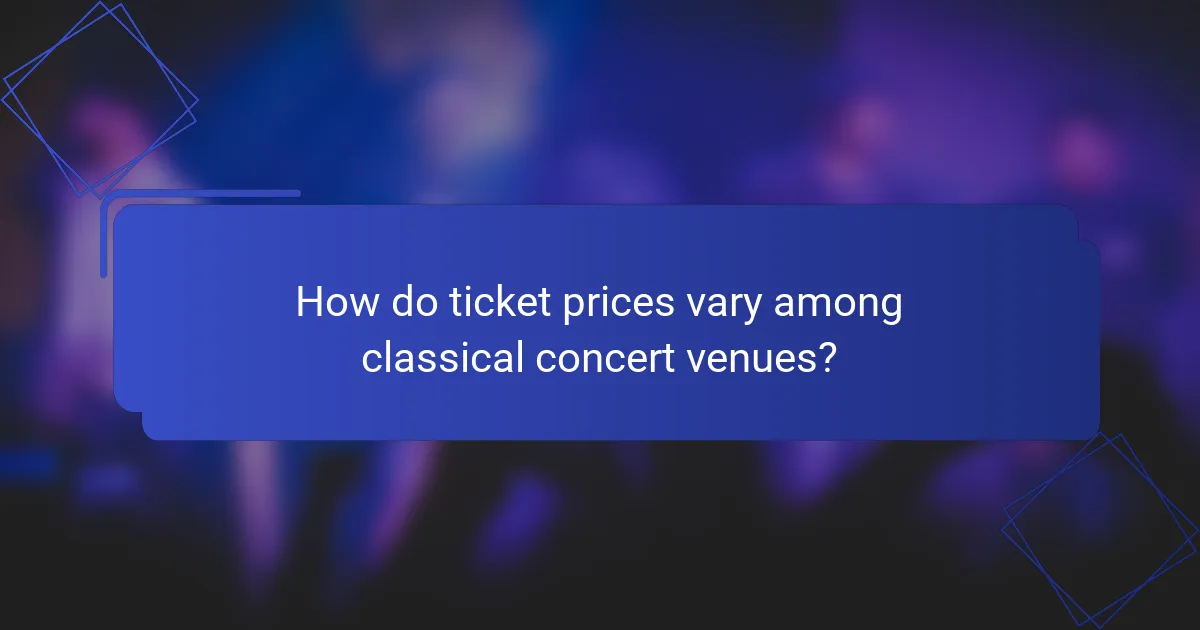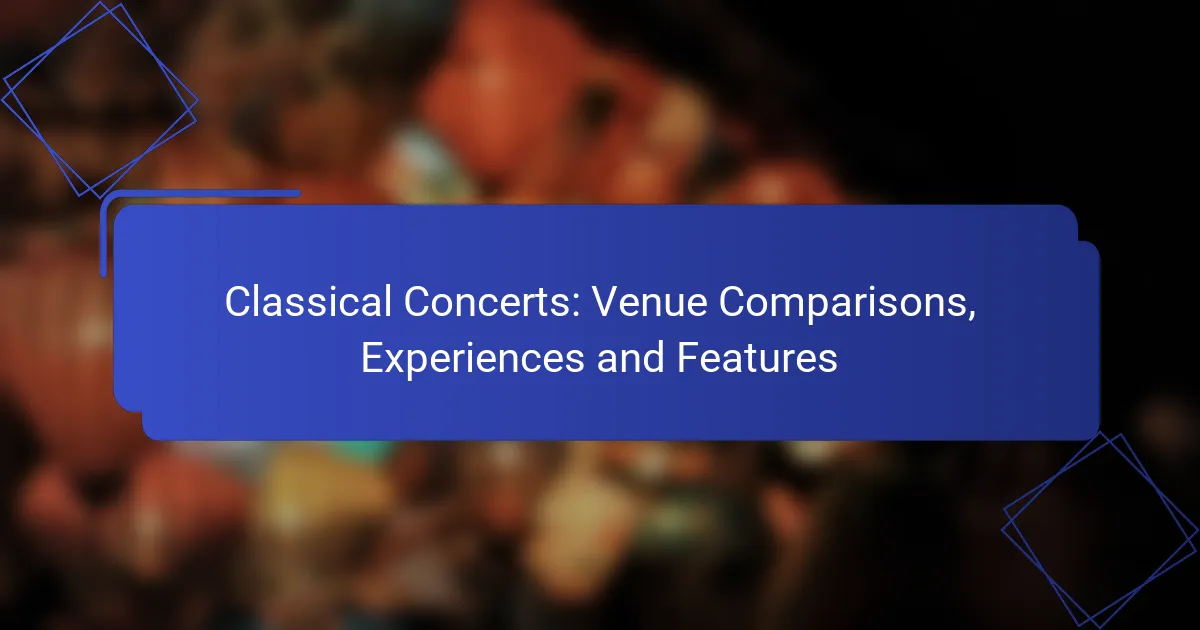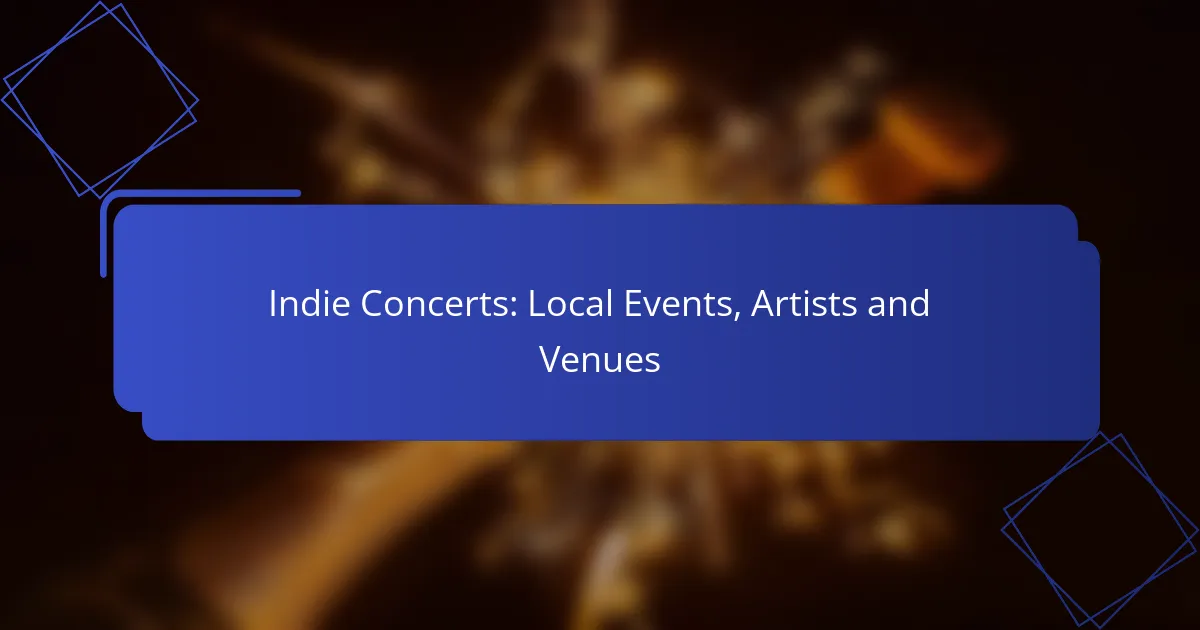Exploring classical concert venues reveals a rich tapestry of experiences shaped by their unique features and acoustics. In cities like New York, venues such as the Metropolitan Opera House and David Geffen Hall stand out for their architectural beauty and sound quality, influencing audience engagement and enjoyment. When choosing a venue, it’s essential to consider factors like seating arrangements and accessibility, which can significantly enhance the overall concert experience.

What are the best classical concert venues in New York City?
New York City boasts several premier classical concert venues, each offering unique experiences and features. The top choices include the Metropolitan Opera House and David Geffen Hall, both known for their exceptional acoustics and stunning architecture.
The Metropolitan Opera House offers grand performances
The Metropolitan Opera House, located at Lincoln Center, is renowned for its lavish productions and world-class performances. With a seating capacity of over 3,800, it is one of the largest opera houses in the world, providing an immersive experience for attendees.
Visitors can expect to see a variety of operas, ballets, and special concerts throughout the season. Ticket prices typically range from around $30 to several hundred dollars, depending on the production and seating choice. It’s advisable to book tickets in advance, especially for popular shows.
David Geffen Hall is renowned for its modern design
David Geffen Hall, home to the New York Philharmonic, features a contemporary design that enhances the acoustic experience. Recently renovated, the hall now accommodates around 2,200 guests and provides an intimate atmosphere for classical music lovers.
Attendees can enjoy a diverse range of performances, from symphonies to chamber music. Ticket prices generally vary from $25 to $150, making it accessible for various budgets. It’s recommended to check the schedule and purchase tickets early to secure the best seats.

How do classical concert experiences differ across venues?
Classical concert experiences vary significantly across venues, impacting audience engagement, sound quality, and overall enjoyment. Factors such as size, layout, and acoustic design play crucial roles in shaping these experiences.
Intimate settings enhance personal connection
Smaller venues, such as local theaters or chamber music halls, foster a close-knit atmosphere that allows for a deeper personal connection between the performers and the audience. The proximity to musicians can create a more engaging and emotional experience, as attendees can see facial expressions and subtle nuances in performance.
These intimate settings often encourage interaction, with audiences feeling more comfortable to respond to performances with applause or even verbal appreciation. Venues like the Wigmore Hall in London exemplify this, where the audience is just a few feet away from the artists.
Large venues provide a grand atmosphere
In contrast, large concert halls and arenas, such as the Royal Albert Hall in London or the Sydney Opera House, offer a grand atmosphere that enhances the spectacle of classical music. The sheer scale of these venues can amplify the emotional impact of orchestral works, creating a sense of awe and grandeur.
However, the size can also lead to a more detached experience, as the distance from the stage may diminish personal connection. Audiences in these venues often enjoy the visual elements of large-scale productions, including elaborate lighting and staging that can accompany performances.
Acoustic design impacts sound quality
The acoustic design of a venue is critical in determining sound quality during a concert. Venues with well-thought-out acoustics, such as the Berlin Philharmonie, are engineered to enhance sound clarity and richness, allowing every note to resonate beautifully throughout the space.
Conversely, poorly designed venues may result in muddled sound or echo, detracting from the listening experience. When choosing a venue, consider its acoustic reputation and how it aligns with the type of performance, as certain compositions may require specific acoustic environments to be fully appreciated.

What features should you look for in a classical concert venue?
When selecting a classical concert venue, consider features that enhance both the auditory and visual experience. Key aspects include seating arrangements, accessibility options, and available amenities that contribute to overall enjoyment.
Seating arrangements affect viewing experience
Seating arrangements play a significant role in how well attendees can see and hear the performance. Venues often offer various configurations, such as traditional proscenium stages or more intimate settings like thrust stages, which can impact sightlines and acoustics.
For optimal viewing, look for venues with tiered seating that allows unobstructed views of the stage. Additionally, consider the distance from the stage; closer seats may provide a more immersive experience, while further seats might offer a broader perspective of the performance.
Accessibility options are crucial for all attendees
Accessibility options ensure that all attendees can enjoy the concert experience. Venues should comply with regulations such as the Americans with Disabilities Act (ADA) in the U.S. or similar standards in other countries, providing wheelchair access, designated seating, and accessible restrooms.
Check if the venue offers assistive listening devices or services for those with hearing impairments. It’s also beneficial to confirm the availability of staff assistance for guests who may need help navigating the venue.
Venue amenities enhance overall enjoyment
Venue amenities can significantly enhance the concert experience. Look for features such as comfortable seating, good acoustics, and climate control, which contribute to a pleasant atmosphere. Additionally, consider the availability of concessions, restrooms, and parking facilities.
Some venues may offer pre-concert talks or post-concert meet-and-greet opportunities with performers, adding value to the experience. Researching these amenities ahead of time can help you choose a venue that aligns with your preferences and needs.

How do ticket prices vary among classical concert venues?
Ticket prices for classical concerts can differ significantly based on the venue’s prestige, location, and the specific performance. Generally, premium venues tend to charge higher prices, while discounts and subscription options can help make attending more affordable.
Premium venues often charge higher prices
Prestigious venues, such as renowned concert halls and opera houses, typically command higher ticket prices due to their reputation and the quality of performances. For example, tickets at iconic locations like the Vienna State Opera or Carnegie Hall can range from the low hundreds to several hundred euros or dollars, depending on the seating choice and the event.
Attendees should consider the overall experience offered by these venues, including acoustics, ambiance, and the caliber of performers, which often justifies the higher cost. However, it’s essential to weigh this against personal budget constraints and preferences for the concert experience.
Discounted tickets are available for select performances
Many venues offer discounted tickets for specific performances, particularly for matinees, student shows, or community outreach events. These discounts can range from 20% to 50% off the regular price, making it more accessible for a broader audience.
To find these deals, check the venue’s official website or sign up for newsletters that announce special promotions. Additionally, some venues may have a limited number of rush tickets available on the day of the performance at a significantly reduced rate.
Subscription packages can offer savings
Subscription packages allow patrons to purchase tickets for multiple concerts at a discounted rate, often saving 10% to 30% compared to buying individual tickets. These packages can include a series of concerts throughout the season, providing a more economical option for regular attendees.
When considering a subscription, evaluate the lineup of performances and your availability to attend. Many venues offer flexible subscription options, allowing you to customize your package based on your preferences and schedule, which can enhance the concert-going experience while keeping costs manageable.

What are the top classical concert festivals in Europe?
The top classical concert festivals in Europe include renowned events that attract world-class musicians and diverse audiences. These festivals showcase a wide range of performances, from orchestral concerts to chamber music, providing unique cultural experiences across various locations.
Salzburg Festival showcases international talent
The Salzburg Festival, held annually in Austria, is one of the most prestigious classical music festivals in the world. It features a mix of opera, concerts, and drama, attracting top-tier international artists and conductors.
Visitors can enjoy performances in stunning venues like the Festspielhaus and the Great Festival Hall. The festival typically runs for about five weeks during July and August, making it an ideal summer destination for classical music lovers.
BBC Proms offers a diverse program
The BBC Proms, based in the UK, is an extensive classical music festival that spans several weeks, usually from July to September. Known for its “Proms in the Park” events, it provides a wide-ranging program that includes orchestral concerts, chamber music, and contemporary works.
One of the unique features of the Proms is its commitment to accessibility, with many concerts offering affordable tickets. This festival is a great way to experience both traditional and modern classical music in iconic venues like the Royal Albert Hall.
Verbier Festival features young musicians
The Verbier Festival in Switzerland is celebrated for its focus on young, emerging talent alongside established artists. This festival typically takes place in July and includes masterclasses, workshops, and performances that highlight the skills of promising musicians.
Set in the picturesque Swiss Alps, the Verbier Festival not only offers high-quality music but also a breathtaking backdrop. Attendees can expect a mix of orchestral and chamber music, making it a vibrant hub for classical music enthusiasts.

How can you enhance your classical concert experience?
Enhancing your classical concert experience involves preparation and engagement. Arriving early, participating in pre-concert talks, and immersing yourself in the venue’s atmosphere can significantly elevate your enjoyment.
Arrive early for pre-concert talks
Arriving early allows you to attend pre-concert talks, which provide valuable insights into the pieces being performed and the composers behind them. These discussions typically take place about 30 minutes before the concert and can deepen your understanding and appreciation of the music.
Consider checking the venue’s schedule for specific details about the talks, as some may feature guest speakers, musicians, or conductors. Engaging with these talks can enhance your listening experience by giving context to the performance.
Be mindful of the venue’s seating policy; arriving early can ensure you secure a good seat and settle in comfortably. This preparation can make a significant difference in your overall enjoyment of the concert.



